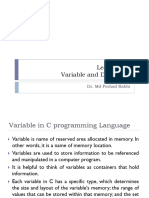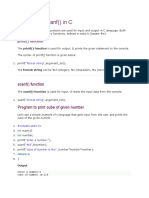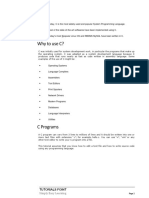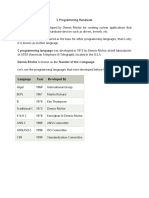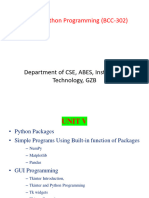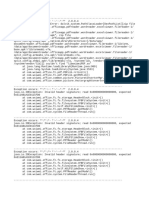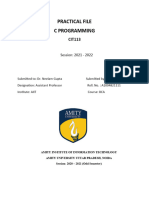C Programming
Topperworld.in
Variables in C
• A variable in C language is the name associated with some memory location
to store data of different types.
• There are many types of variables in C depending on the scope, storage class,
lifetime, type of data they store, etc.
• A variable is the basic building block of a C program that can be used in
expressions as a substitute in place of the value it stores.
• A variable in C is a memory location with some name that helps store some
form of data and retrieves it when required.
• We can store different types of data in the variable and reuse the same
variable for storing some other data any number of times.
©Topperworld
C Variable Syntax
The syntax to declare a variable in C specifies the name and the type of the
variable.
data_type variable_name = value; // defining single variable
or
data_type variable_name1, variable_name2; // defining multiple variable
Here,
• data_type: Type of data that a variable can store.
• variable_name: Name of the variable given by the user.
• value: value assigned to the variable by the user.
©Topperworld
�C Programming
There are 3 aspects of defining a variable:
1. Variable Declaration
2. Variable Definition
3. Variable Initialization
➔ C Variable Declaration
• Variable declaration in C tells the compiler about the existence of the
variable with the given name and data type.
• No memory is allocated to a variable in the declaration.
➔ C Variable Definition
• In the definition of a C variable, the compiler allocates some memory and
some value to it.
• A defined variable will contain some random garbage value till it is not
initialized.
Example:
int var;
char var2;
➔ C Variable Initialization
• Initialization of a variable is the process where the user assigns some
meaningful value to the variable.
Example:
int var; // variable definition
var = 10; // initialization
or
int var = 10; // variable declaration and
definition
©Topperworld
�C Programming
Rules for Naming Variables in C
• A variable name must only contain alphabets, digits, and underscore.
• A variable name must start with an alphabet or an underscore only. It
cannot start with a digit.
• No whitespace is allowed within the variable name.
• A variable name must not be any reserved word or keyword.
Types of Variables
The C variables can be classified into the following types:
➢ Local Variables
➢ Global Variables
➢ Static Variables
➢ Automatic Variables
➢ Extern Variables
➢ Register Variables
➔ Local Variables in C
• A Local variable in C is a variable that is declared inside a function or a
block of code.
• Its scope is limited to the block or function in which it is declared.
➔ Global Variables in C
• A Global variable in C is a variable that is declared outside the function or
a block of code.
• Its scope is the whole program i.e. we can access the global variable
anywhere in the C program after it is declared.
©Topperworld
�C Programming
➔ Static Variables in C
• A static variable in C is a variable that is defined using the static keyword.
It can be defined only once in a C program and its scope depends upon
the region where it is declared (can be global or local).
• The default value of static variables is zero.
➔ Automatic Variable in C
• All the local variables are automatic variables by default. They are also
known as auto variables.
• Their scope is local and their lifetime is till the end of the block. If we need,
we can use the auto keyword to define the auto variables.
• The default value of the auto variables is a garbage value.
➔ External Variables in C
• External variables in C can be shared between multiple C files. We can
declare an external variable using the extern keyword.
• Their scope is global and they exist between multiple C files.
➔ Register Variables in C
• Register variables in C are those variables that are stored in the CPU
register instead of the conventional storage place like RAM.
• Their scope is local and exists till the end of the block or a function.
• These variables are declared using the register keyword.
• The default value of register variables is a garbage value.
©Topperworld
�C Programming
➔ Example:
// C Program to Demonstrate Various types of variable
#include <stdio.h>
// Global variable
int globalVar = 10;
int main() {
// Automatic (default) variable
int autoVar = 5;
// Local variable
int localVar = 20;
// Static variable
static int staticVar = 15;
// Extern variable (declared in another file)
extern int externVar;
// Register variable (not guaranteed to be stored in memory)
register int regVar = 25;
printf("Global variable: %d\n", globalVar);
printf("Automatic variable: %d\n", autoVar);
printf("Local variable: %d\n", localVar);
printf("Static variable: %d\n", staticVar);
printf("Extern variable: %d\n", externVar);
printf("Register variable: %d\n", regVar);
return 0;
}
Output:
Global variable: 10
Automatic variable: 5
Local variable: 20
Static variable: 15
Register variable: 25 ©Topperworld
�C Programming
➔ Constant Variable in C
• Till now we have only seen the variables whose values can be modified
any number of times.
• C language also provides us a way to make the value of a variable
immutable. We can do that by defining the variable as constant.
• A constant variable in C is a read-only variable whose value cannot be
modified once it is defined. We can declare a constant variable using
the const keyword.
Example:
// C Program to Demonstrate constant variable
#include <stdio.h>
int main()
{
int not_constant;
const int constant = 20;
// changing values
not_constant = 40;
constant = 22;
return 0;
}
Output:
Constant = 22
©Topperworld























